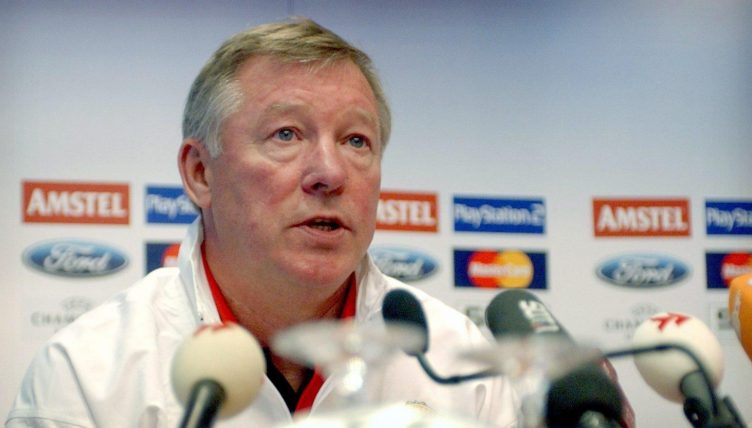Remembering Sir Alex Ferguson’s war on the media & blood-feud with the BBC

Sir Alex Ferguson was never afraid to flex his muscles and put his foot down when he felt wronged by the media during his legendary tenure as Manchester United manager, but no company felt his wrath more than the BBC.
Plenty of journalists and reporters had felt the wrath of the man who ruled Manchester with an iron fist, but none of those tiffs compared to his seven-year boycott of the public broadcasting behemoths.
May 27, 2004. BBC Three airs a documentary titled ‘Fergie And Son’ which investigates the relationship and subsequent business dealings between United and Ferguson’s son Jason – a registered agent.
That single documentary, probing two specific transfer deals involving Massimo Taibi and later Jaap Stam over certain payments made when completing them, lit a fire under Ferguson that no journalist had ever managed to do before.
And that was some going.
Suddenly, the most renowned broadcasting service in the United Kingdom had lost access to a living football legend and the manager of arguably the biggest club in the world.
Ferguson refused to speak to journalists working for the BBC as of the 2004-05 season, before going on a complete boycott of the broadcaster from that November.
‘Arrogant beyond belief’ were the words he used to describe the BBC when asked about his reasons for the boycott some three years later at an event in Glasgow, pulling no punches as he continued to go to war with a broadcaster responsible for showing increasing amounts of football.
Complete delirium. It was the inevitable result of an unstoppable force meeting an immovable object, but nobody could quite believe that it had actually happened or continued to occur.
It was even more absurd when taking a step back and realising that it was essentially because someone had been picking on his son.
Football is an ever-evolving game, however, and at the time he was able to flex his muscles to ban broadcasters and reporters he felt were trying to go against his team or not tell the truth.
Throwback to when Sir Alex Ferguson had to put journalists back in their place
"You lie. Your job is to tell the tell the truth, if you can't do that you're in the wrong job. Do I make myself clear?"#Mufc #SirAlex pic.twitter.com/dtA6Qh2PNA
— 🔰 Totally Man Utd™ 🔰 (@TotallyMUFC) January 28, 2018
Crucially, it worked. And it still does.
The lasting effect of Ferguson’s cold shoulder to media outlets has been a siege mentality embedded into an era of United supporters, who are welcoming of the ‘us against the world’ dynamic – especially when the chips are down.
Ferguson would eventually come to a truce with the broadcast giants in 2011 following a meeting with then-Director General Mark Thompson, but not without some push and shove.
It took intervention from the Premier League in 2010-11 when they introduced rules that ensured managers must speak to major broadcasters and rights holders. But that didn’t work – obviously – with Ferguson doubling down and United prepared to pay any fines thrown their way.
Those fines never came and Mike Phelan continued to deputies for his boss where possible, until Thompson landed the truce in 2011.
While the BBC eventually found a way back in, though, they weren’t the only ones to have been kicked to the curb.
In the same year that he agreed to peace with the BBC, Ferguson had banned Sky News from his press conferences after their microphone picked up a conversation involving him requesting for Rob Harris – then of the Associated Press – to be banned by a press officer for asking a question he didn’t like about Ryan Giggs after he’d missed training.
And that’s just the tip of the iceberg.
During his reign as United manager, despite appearing as the all-seeing, all-knowing entity in complete control, Ferguson wasn’t afraid to lose his rag. Anyone could get it.
Journalists were told they were ‘f*cking idiots’ as he completely lost it in 2002 when Juan Sebastian Veron came under scrutiny for his performances, a staunch defence of his player that showed to what lengths he’d go to protect his team.
MUTV got it in 2005 after a presenter suggested they’d prefer to see United in a 4-4-2 rather than a 4-5-1, and got the silent treatment again in 2011.
Geoff Shreeves was told to ‘f*ck off’ when working for Sky in 2007 after he asked if Cristiano Ronaldo had dived to win a penalty, while countless journalists would often get anything from a hairdryer treatment and unsavoury words about their work to a complete ban from the pre-match press conference if he felt they had crossed him.
It was a sign of his complete authority over the club and exactly how important control was to him to maintain a firm grasp on the dressing room.
Results will always be the defining factor, but it’s what environment a manager creates to enable them to get those results.
Ferguson had a book of tricks up his sleeve to keep the Red Devils on top, involving the dark arts.
His ability to go to war with the media – no matter how big or small a fish they were – was one of the longest, ugliest and yet most surreal chapters of that book.
By Mitch Wilks
READ NEXT: Recalling Sir Alex Ferguson’s crazy final game as Man Utd manager
TRY A QUIZ: Can you name Sir Alex Ferguson’s 30 most-used players at Man Utd?